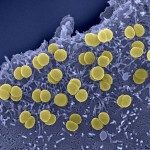Lien vers Pubmed [PMID] – 12160636
Trends Microbiol 2002 Aug; 10(8): 376-82
Neisseria meningitidis is a commensal bacterium of the human nasopharynx that occasionally provokes invasive disease. Carriage strains of N. meningitidis are heterogeneous, more frequent in nature and are transmitted among carriers. Disease is not a part of this transmission cycle and is caused by virulent strains. N. meningitidis is highly variable and variants that are modified in their virulence and/or transmissibility are continually generated. These events probably occur frequently, thus explaining not only the heterogeneous nature of meningococcal populations in carriers but probably also the evolutionary success of this human-restricted bacterium.

